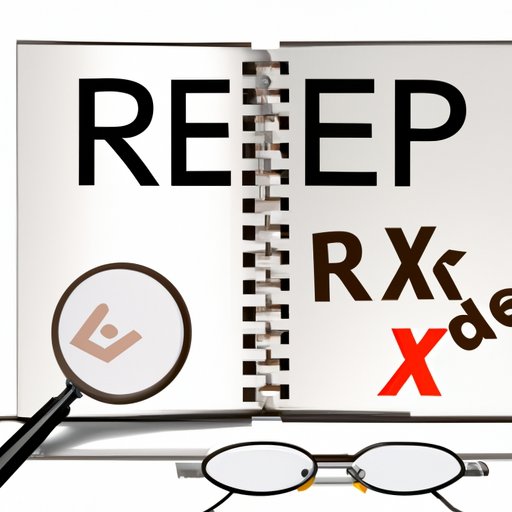
I. Introduction
In today’s job market, having strong references who can attest to your skills and work ethic can be the decisive factor in landing your dream job. However, asking someone to be your reference can be daunting, especially if you’re not sure how to go about it. In this comprehensive guide, we share practical tips and techniques to help you ask someone to be your reference with confidence.
II. 5 Steps to Effectively Ask Someone to be Your Job Reference
Here are the five essential steps you need to follow when asking someone to be your job reference:
A. Identify potential references
The first step is to identify potential references who can vouch for your skills and experience. Consider previous managers, colleagues, or mentors who can provide a positive and objective assessment of your work.
B. Reach out and ask for their permission
Once you’ve identified potential references, reach out to them and ask if they would be willing to be your reference. Make sure to express your gratitude for their time and support.
C. Provide them with necessary information
After getting their consent, provide your references with the necessary information about the job you’re applying for. Share your resume, cover letter, and job description so that they can tailor their reference to the job requirements.
D. Give them proper context
When asking for a reference, provide your references with context on the position you’re applying for, as well as the skills and experiences you want them to highlight in their reference. This will help them write a more tailored and effective reference.
E. Express gratitude
Finally, express your gratitude to your references for taking the time to speak with potential employers on your behalf. A simple thank-you note or email can go a long way in showing your appreciation.
III. The Art of Requesting a Reference: Tips for a Successful Ask
Here are some additional tips to help you make a successful request for a reference:
A. Build relationships with potential references beforehand
Before you need to ask someone to be your reference, make sure to build a relationship with them in advance. This can be as simple as keeping in touch over email or LinkedIn, or asking for feedback on a project you’re working on.
B. Choose appropriate references
Choose references who can speak to your most significant achievements, skills, and experiences. Select references who can vouch for your work and character.
C. Make the request in a respectful and professional manner
When making your request, make sure to be professional and respectful. Explain the job you’re applying for and the skills you want them to highlight in their reference. Let them know the deadline for the reference and any other necessary details.
D. Provide a clear and concise context
When providing context for a reference, be concise and specific. Let them know the job title, company name, and the skills you want them to highlight in their reference. Give clear examples of your work together so that they can add more personal touches to their reference.
E. Follow up and express gratitude
After your reference has written your reference, follow up to thank them for their time and effort. This will show your appreciation and help you maintain the relationship for future opportunities.
IV. Asking for Professional Endorsements: A Guide to Requesting Job References
A. Understanding the purpose of professional endorsements
Professional endorsements are a type of reference that involves having your skills and achievements verified by experts in your field. This type of reference can be especially useful when applying for highly specialized jobs or industries.
B. How to identify and approach potential endorsers
When identifying potential endorsers, look for people who hold a high level of respect and authority in your field. Reach out to them personally and express your interest in their endorsement. Make sure to share more information about the job you’re applying for and your relevant skills and experiences.
C. Guidelines for requesting endorsements
When requesting endorsements, provide clear guidelines for what you’re looking for. Share your LinkedIn profile and a CV, and explain why you need their endorsement. Let them know the time frame you’re looking for, and how you plan to use the endorsement.
D. Providing information to help endorsers make their endorsement
Make sure to provide specific details that endorsers can use to write the endorsement. Share your past work examples, a summary of your skills and experiences, and any other information that can help them write a strong endorsement.
E. The dos and don’ts of requesting professional endorsements
Do treat endorsers with respect and be clear about your needs. Don’t be pushy or demand an endorsement. Remember, an endorsement is an assessment of your skills, not a guarantee of a job offer.

V. How to Approach Asking a Busy Professional to be Your Job Reference
A. Understanding the context and challenges of asking busy professionals
Asking a busy professional to be your job reference can be challenging, given their busy schedules. Make sure to approach them professionally and respectfully, understanding that their time is precious.
B. Choosing the right time and method to make the request
Choose the right time and method to make your request. Consider sending a polite email or making a phone call when they’re not in a meeting or other engagements. Make sure to keep your request brief and to the point.
C. Offering to make it easy for your reference
Offer to make it easy for your reference by providing them with all the necessary information upfront. This will save them time and show them that you’re proactive and professional.
D. Keeping your request brief and to the point
When making your request, keep it brief and to the point. Let them know why you’re approaching them, the job you’re applying for, and the relevant skills and experiences you want them to highlight in their reference.
E. Following up with a thank-you note or email
After your reference has completed the reference, make sure to follow up with a thank-you note or email, expressing your gratitude for their time and support.
VI. Mastering the Art of the Ask: How to Request a Reference with Confidence
To master the art of the ask, here are some tips to help you request a reference with confidence:
A. Boosting your confidence before making a request
Boost your confidence by researching the company and the job you’re applying for. Make sure to highlight your relevant skills and experiences in your request to your reference.
B. Techniques to articulate yourself clearly
Use clear and concise language when making your request. Practice your pitch in front of a mirror or with a friend to work out any awkward phrasing or stumbling blocks.
C. The power of active listening and empathy
When making your request, practice active listening and empathy toward your potential reference. Let them know why you think they’re the right reference for the job and highlight their strengths and achievements.
D. Anticipating common concerns and questions
Anticipate common concerns and questions your reference may have and provide them with the answers they need upfront. For example, let them know the job title, company name, and relevant skills and experiences you want them to highlight.
E. Using positive language to convey your message
Use positive language throughout your request to convey your message effectively. Be sure to express your gratitude and appreciation for their time and support.
VII. Expert Advice: How to Ask Someone to be Your Job Reference and Secure the Position
Here are some tips and advice from career experts on how to ask someone to be your job reference and secure the position:
A. Tips from career experts on how to request job references
Experts recommend building relationships with potential references beforehand, choosing appropriate references, and making the request in a respectful and professional manner.
B. Best practices to help you secure the job
To secure the job, make sure to provide your reference with the necessary information, build relationships with potential references beforehand, choose appropriate references, and follow up with a thank-you note or email.
C. Common mistakes to avoid when asking for a reference
Common mistakes to avoid when asking for a reference include being pushy or demanding, not providing enough information upfront, or not expressing your gratitude for their time and effort.
D. Success stories and examples to learn from
Read success stories and examples of how people successfully secured jobs through strong references. Learn from their experiences to increase your chances of success.
E. Final words of advice
Finally, career experts recommend maintaining strong relationships with your references, expressing your gratitude, and using effective communication skills to convey your message.
VIII. Conclusion
Asking someone to be your job reference can be nerve-wracking, but with our comprehensive guide and expert advice, you can do it with confidence. Remember to build relationships with potential references beforehand, provide necessary information and context, and express your gratitude for their time and support.




